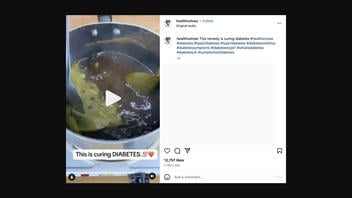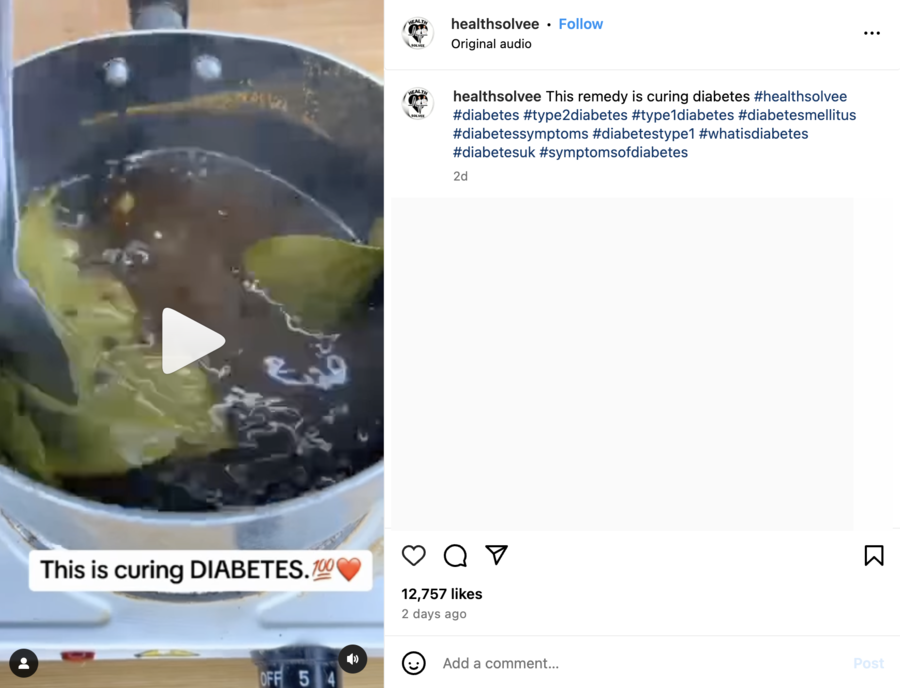
Is a tea made of guava leaves, cloves and turmeric proven to "cure diabetes," as suggested in a post on Instagram? No, that's not true: "There is no credible scientific or medical evidence for this," an endocrinologist told Lead Stories. There is no known cure for either type of diabetes, they said.
Treatment of the chronic condition typically involves lifestyle changes and medications. While some studies indicate guava leaves, cloves and turmeric may be beneficial in the management of conditions associated with diabetes, there is no evidence that a tea made of all three will cure the condition, a nutrition expert confirmed. Furthermore, components of cloves and turmeric may interact with diabetes medications to cause harm, a registered dietician told Lead Stories.
The claim originated in a video shared on Instagram on January 2, 2024, (archived here) with a text overlay on the video that read, "This is curing DIABETES.💯❤️." A caption with the post read:
This remedy is curing diabetes #healthsolvee #diabetes #type2diabetes #type1diabetes #diabetesmellitus #diabetessymptoms #diabetestype1 #whatisdiabetes #diabetesuk #symptomsofdiabetes
This is how the post appeared at the time of writing:
(Source: Instagram screenshot taken Fri Jan 5 07:27:51 UTC 2023)
An unidentified voice in the video advised viewers to boil guava leaves, turmeric and cloves in a pot with "enough" water and "get the excess sugar out of your blood and end diabetes, poor circulation and high blood pressure forever."
"There is no credible scientific or medical evidence for this claim," Dr. Michael McDermott (archived here), director of endocrinology practice at UCHealth University of Colorado Hospital, told Lead Stories in an email received January 26, 2024.
Diabetes is a chronic health condition that affects how the body turns food into energy, according to the Centers for Disease Control and Prevention (CDC). There is no known cure for the condition.
"Diabetes is a chronic, progressive condition. That means that it is a condition that once diagnosed stays with you for life and it might progress to get worse with time, if not treated. To date, there is no known cure for diabetes," Sandra Arévalo (archived here), a certified diabetes educator and administrative director of the Jacob's Family Pride Wellness Center at Montefiore Nyack Hospital in Nyack, New York, told Lead Stories in an email received on January 12, 2024.
There are three types of diabetes: Type 1 is believed to occur after an autoimmune reaction destroys the body's ability to produce insulin, thereby requiring patients to take manufactured insulin to survive; type 2 occurs when the body produces insulin but does not use it well; and gestational diabetes occurs during pregnancy and usually resolves after the baby is born, according to the CDC.
"For type 1 diabetes, there is no known cure but potential cures are under investigation," McDermott told Lead Stories. "For type 2 diabetes, there is also no cure but remission can be achieved with adequate amounts of weight loss in many people; in remission means that the disease is no longer active but will likely reappear if the weight is regained."
However, there is some evidence that guava leaves, turmeric and cloves could alleviate the effects of the condition based on laboratory (in vitro) and animal studies.
"Guava leaves, turmeric, and cloves have been studied for their potential to lower blood sugar and research suggests there could be a benefit to reducing blood sugar when consuming these herbs and spices individually. However, none of these or other foods, supplements, and herbal remedies will cure diabetes," Melissa Prest (archived here), a Chicago-based registered dietician nutritionist and spokesperson for the Academy of Nutrition and Dietetics, told Lead Stories in an email received on January 10, 2024.
Guava leaves show antidiabetic effects in animal models
Guava has shown some promise in animal models, though this research cannot be translated directly into humans. Guava leaf tea and extracts have potential anti-diabetic effects in animal models (archived here) and may play roles in insulin resistance (archived here) and improved cardiovascular functions (archived here) in mice. As such, guava could help some conditions associated with diabetes (archived here).
"Research in both animal and human studies shows that guava leaf tea helps to lower the rise in blood sugar after a meal. However, none of the studies reported that people were cured from consuming the tea," Prest wrote.
Turmeric may reduce inflammation, oxidative stress
Turmeric has anti-inflammatory effects, and laboratory (in vitro) and animal models show that turmeric may benefit diabetes. The bright yellow-orange spice has also been associated with a lower risk of developing diabetes (archive here), holds hypoglycemic properties (archive here) and could help weight management (archive here). Properties in turmeric may also reduce inflammation and oxidative stress (archive here), or an imbalance between oxidants and antioxidants in the body.
"Turmeric has shown some potential in animal studies in lowering blood sugar and improving insulin resistance, but not to the point of curing this condition, and more human studies are needed," wrote Prest.
However, it is not known how well turmeric influences human health and the spice may strengthen the effects of diabetes drugs, according to Mount Sinai.
Compounds in cloves may help lower blood sugar levels
Eugenol, a compound found in cloves, has also been found to help lower high blood sugar levels (archive here) in animal studies, showing positive effects on diabetic rats (archive here).
But just like turmeric, too much eugenol "could exacerbate the effect of some diabetes medications," (archive here) Arévalo wrote.
"While it is commonly believed that if you consume an herb or supplement then it's safer for you, many herbs and supplements can interact with other medications you are taking. Eugenol, a compound common in cloves, can interact with insulin and cause dangerously low blood sugar. It can also affect your ability to form blood clots, this is similar to turmeric's interaction with blood thinner medications," Prest wrote.
Diabetes should be treated under the care of a medical professional
Treatment typically includes management through diet, exercise and physician-approved medications.
"Diabetes is a serious and complex condition that requires medication intervention. At this time there is no known cure," Prest wrote. "People with diabetes should be followed by a physician who can prescribe medications to help control blood sugars. It is also important to change your diet and lifestyle so working with a dietitian or nurse who specializes in diabetes care is important," she wrote.
If left untreated, diabetes can cause damage to blood vessels and nerves, as well as lead to other health conditions like heart and kidney diseases. It ranks as the eighth leading cause of death in the United States, according to the CDC.
"Diabetes is a silent killer," Arévalo told Lead Stories. "It is important to listen to your doctor, continue your diabetes treatment as prescribed, and not to experiment with any herbal treatments on your own. If you take any herbs or supplements always tell your doctor."
Additional Lead Stories fact checks on health-related topics can be found here.


















